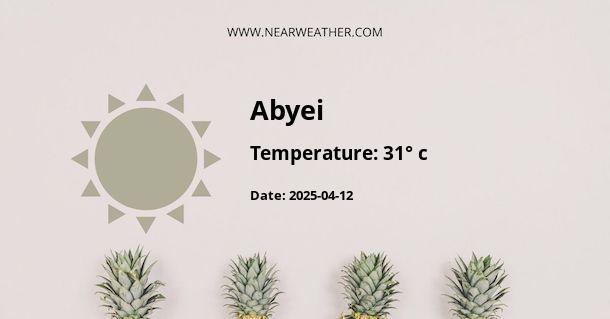Abyei, Sudan: Climate and Weather Year Round
Abyei, located in Sudan, is a region with a unique climate and weather patterns. Understanding the climate and weather conditions of Abyei is essential for residents, travelers, and businesses in the area. In this article, we will explore the climate, temperature, precipitation, and other weather factors that influence Abyei throughout the year.
Geographical Location
Abyei is situated in the central part of Sudan, near the border with South Sudan. It lies within the Abyei Area, a disputed region between Sudan and South Sudan. The location of Abyei influences its climate, as it is located in a transition zone between the Sahel and Sudanian climatic zones.
Climate Classification
Abyei experiences a hot desert climate (Köppen climate classification BWh), characterized by hot and dry conditions for most of the year. However, due to its transitional location, it also receives slightly more rainfall than typical desert regions.
Temperature
The temperature in Abyei remains high throughout the year. The hottest months are April and May, with average temperatures exceeding 40°C (104°F). The summer months from June to September also experience high temperatures, ranging from 35°C to 40°C (95°F to 104°F). Even during the cooler months of December and January, temperatures can still reach around 30°C (86°F).
The diurnal temperature variation is significant in Abyei. During the day, temperatures can rise to extreme levels, but at night, they drop considerably. This temperature fluctuation can be challenging for individuals who are not accustomed to such variations.
Precipitation
Abyei receives most of its rainfall during the summer months, particularly in July and August. The region experiences a short rainy season, with an average annual precipitation of around 400 to 600 millimeters (15.7 to 23.6 inches). The rainfall is essential for agriculture and sustenance of the local communities.
However, it is worth noting that Abyei is located in a semi-arid region, and droughts are not uncommon. The irregularity and variability of rainfall patterns can pose challenges for agricultural practices and water resources management.
Wind Patterns
Abyei is influenced by the prevailing wind patterns of the region. The Harmattan winds, blowing from the northeast, are common during the winter months. These winds bring hot and dry conditions, often carrying dust and sand particles from the Sahara Desert. The Harmattan winds can reduce visibility and create hazy conditions in the area.
Seasonal Variations
Abyei experiences distinct seasons throughout the year. The dry season, from November to May, is characterized by hot and arid conditions. The wet season, from June to October, brings relief in the form of rainfall, but also higher humidity levels.
During the wet season, Abyei undergoes a transformation, with previously dry landscapes turning green and vibrant. The rainy season supports agriculture and contributes to the growth of vegetation in the area.
Extreme Weather Events
While Abyei is not prone to severe weather events like hurricanes or tornadoes, it can experience occasional dust storms and sandstorms, particularly during the dry season. These storms can reduce visibility and affect daily activities in the region.
Conclusion
Abyei, Sudan, experiences a hot desert climate with a short rainy season. The region's temperature remains high throughout the year, with extreme heat during the summer months. Precipitation is concentrated in the wet season, supporting agriculture and vegetation growth. The prevailing Harmattan winds and occasional dust storms contribute to the unique weather patterns in Abyei. Understanding the climate and weather of Abyei is crucial for residents, travelers, and businesses operating in the region.
A - Abyei's Latitude is 9.595250 & Longitude is 28.434931.
A - Weather in Abyei is 31° today.
A - Climate Conditions in Abyei shows overcast clouds today.
A - Humidity in Abyei is 43% today.
A - Wind speed in Abyei is 1.48 km/h, flowing at 2° wind direction. today.
